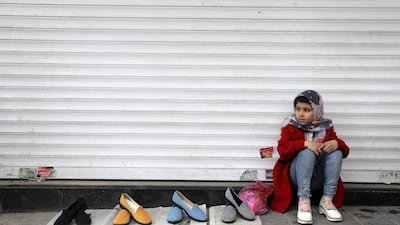Yesterday, 300 million people across the globe celebrated the 3,000-year-old festival of Nowruz which celebrates the beginning of spring. The event is celebrated in different formats in countries as diverse as Albania, India, Iraq, Tanzania and Kazakhstan. But for all those who participate in it – many are from non-Persian identifying communities – the celebration focuses on emerging from the darkness of winter into a new season of light.
For Iran, in which Nowruz is the most important non-Islamic holiday, recent calls for a brighter future have gone unanswered. After decades of isolation, the nation now ranks among the countries worst-affected by Covid-19, having had to date almost 1.8 million confirmed cases of the virus. The true number is probably far higher.
The pandemic struck at a time when the country's economy was already struggling. Longstanding corruption, economic mismanagement and a severe US-led sanctions regime has resulted in rates of inflation as high as 40 per cent in 2019. In the same year the country's economy contracted by almost seven per cent.
This is just one prong of a longstanding foreign policy of intimidation, which also includes, to name just a few, hostage-taking and the use of the country's wide network of destabilising proxies in the Middle East. In recent years, the world has seen the extent of the damage these groups can inflict. On Friday, Saudi Arabia suffered the latest in a string of drone attacks targeting its oil facilities. While no party has yet claimed responsibility for the strike, Yemen's Iran-backed Houthi rebel group have consistently launched similar drone operations, the most devastating of which targeted Saudi oil refineries in 2019, momentarily suspending over half the Kingdom's output, making it an attack on the entire global energy system.Iran's impoverishment was never inevitable. It is strategically located, with a young and highly educated population. It holds a vast range of natural resources, including the second-largest natural gas reserves globally, an array of largely untapped precious materials and excellent conditions for sustainable wind and solar energy, which could comfortably provide enough power to meet the country's electricity needs. And yet, Tehran pours money into an illicit nuclear programme that it claims is solely for the purpose of generating atomic energy. It is, instead, covering up its activities and refuses to verify its programme in the manner that other countries around the world do. With a declared regime target of destroying Israel by 2040, the vast majority of the international community is calling urgently for the programme to be halted.
Elections in June mean that 2021 will be a year of new beginnings in Iran. But with the country's hardline factions desperately pushing for the election of the most reactionary candidate they can find, Covid-19 raging on and an economy in sharp decline, change this year could well be for the worse.



